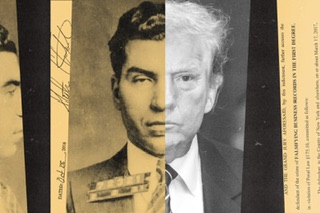
From lowlife Chucky to lower Donnie If you’re wondering how Donald Trump’s hush money trial is likely to turn out, check it out.
According to SLATE, it’s worth casting an eye back to a 1938 mob case. The decision in People v. Luciano—ironically also a trial involving “family business”—will help prosecutors connect Trump to all the crimes with which he’s charged. That is so even if the jury discounts the few parts of the testimony from Michael Cohen that were uncorroborated, including his one-on-one conversations with Trump tying him to the crimes.
Perhaps you’ve heard of Charles “Lucky” Luciano, the convicted defendant in People v. Luciano. He was once the “very public head” of the Five Families in the golden age of American mobsters. His conviction for running a prostitution enterprise was affirmed by New York’s highest court in a case with powerful application to Trump’s prosecution. (Luciano’s prosecutor was, incidentally, the young Manhattan District Attorney Thomas E. Dewey, the future Republican governor of New York and presidential candidate against FDR in 1944 and Harry Truman in 1948.)
Much of Trump’s defense at trial consists of getting prosecution witnesses to admit that Trump himself didn’t falsify his company’s books, because others in his tightknit enterprise made the physical entries and drafted the checks that he signed with his notorious black Sharpie.
His attempt to insulate himself from the final stages of the scheme enables Trump and his lawyers to assure his credulous supporters that the district attorney has nothing on him. But the jury will soon hear that New York criminal law is not so naïve as to allow the ringleader of a criminal scheme to get off scot-free, simply because his minions did the deeds.
Under a long-standing rule of Criminal Law 101, acts by any co-conspirator are attributable to each member of the conspiracy, if the acts are intended to further the object of the conspiracy. In other words, each conspirator is liable for the crimes of the others committed in pursuit of the illegal objective. It doesn’t matter who committed the act or who didn’t.
But wait, you say! Prosecutors did not charge a conspiracy in this case.
That’s where People v. Luciano comes in. The New York Court of Appeals there made clear that if a conspiracy is proven by the evidence, it need not be charged for the rule of vicarious liability to apply.
Accordingly, because prosecutors in Trump’s case have laid a sufficient evidentiary foundation for the jury to find that there was a criminal scheme with multiple participants, Justice Juan Merchan will instruct jurors that, should they determine that Trump participated in the broader conspiracy, they may find him liable for any and all other conspirators’ actions.